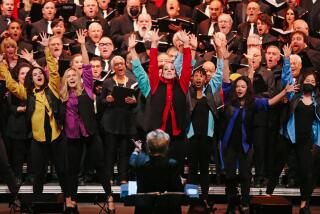MUSIC REVIEW : CHORALE PRESENTS MENDELSSOHN PIECE
By virtue of its cantata-finale, Mendelssohn’s quirky, tuneful “Lobegesang” Symphony is performed much more often by choral rather than orchestral organizations. Saturday night at Orange Coast College, it provided the substance for the final Orange Coast Chorale concert of the season.
If anything, however, the division of labor in this “symphony-cantata” favors the instrumental forces. Not a note is sung in the first three movements, which placed a heavy burden Saturday on the supporting orchestra.
It was not a bad band, as such pick-up groups go. Conductor Richard Raub, working from memory and without a baton, elicited tidy, unexceptional playing. The brass section proved distinguished by both the quality and quantity of its sound, consistently overwhelming the slender string sections.
The effort never rose above the prosaic, for which Mendelssohn and Raub were equally responsible. And in the stuffy Robert Moore Theatre, crickets and photographers prowling the wings competed with the orchestra in both volume and interest.
Raub’s 78-voice chorale is an earnest, able group. Sectional balances were nice, although individual voices could be heard, and the ensemble sang its English translation cleanly. The sound was light and a little raw in the climaxes, but rhythmically buoyant.
Tenor Bruce Johnson evinced similar qualities in his important tasks, though his moments of wavering control may have been forced in the unequal struggle with the over-achieving brass. When accompanied by the strings alone, he sounded agreeably bright.
Annie Kim supplied a clear, supple account of the soprano solo. Mezzo-soprano Candice Burrows sounded slightly hoarse while capably partnering Kim and Johnson in the two duets.
Mendelssohn went to appreciable lengths to unify this sprawling composition musically. Raub, however, inserted an intermission before the finale. The work would have had greater impact without the break, which was hardly demanded by excessive length.
To give the chorale something to do on the first half of the program, Raub began with Verdi’s chorus “Va, pensiero, sull’ali dorate” from Act III of “Nabucco.” The chorale was not nearly as persuasive in Italian as in English, singing stiffly and lacking any urgency or poignancy.
More to Read
The biggest entertainment stories
Get our big stories about Hollywood, film, television, music, arts, culture and more right in your inbox as soon as they publish.
You may occasionally receive promotional content from the Los Angeles Times.










